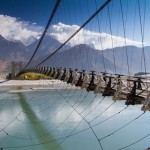Pakistan’s bad choices – supporting terrorism in Afghanistan and India, its military’s interference in the political process, and economic mismanagement – are hitting its economy hard. These economic problems may also hurt the ambitious $62-billion China Pakistan Economic Corridor (CPEC), which is a key component of China’s Belt and Road Initiative (BRI).
On April 4, 2018, the United Nations listed 139 terrorists currently based out of Pakistan, including Hafiz Saeed and Dawood Ibrahim[1]. This comes barely a week after the U.S. State Department designated two Pakistan-based groups – offshoots of the Lashkar-e-Taiba – as terrorist groups[2] and almost a month after the Financial Action Task Force decided to place Pakistan on its ‘grey list’ of countries for providing financial support to terrorism[3]. These developments will make it difficult for Pakistan to attract foreign investment and for Pakistan’s exporters to tap foreign markets as extra scrutiny of financial transactions makes the country less attractive to outsiders.
The citations for terrorism couldn’t have come at a worse time for the Pakistani economy, which is under stress on two other fronts:
- Political uncertainty: Pakistan is due to hold a general election in 2018 and is currently witnessing a confrontation between the former Prime Minister Nawaz Sharif and the military.
- Weak balance of payments: Pakistan’s foreign exchange reserves have been in slow decline for the past 15 months – falling from $18.3 billion in January 2017 to $11.7 billion in March 2018[4] – with less than three months of import cover. Pakistan’s negative trade balance widened during 2016-17, when imports shot up even as exports remained flat[5]. As a result, the Pakistani rupee has been devalued twice since December 2017, losing 10% of its value.
Pakistan has waived off this uncertainty, placing all its hopes on CPEC, which envisages power plants, ports, airports, roads and railway lines for Pakistan, hoping it will be a game-changer for the Pakistani economy.
A commonly expressed view is that Pakistan’s exports will improve after CPEC projects are implemented, solving the country’s problems.
However, this may not work as planned. More than half of CPEC projects have not even been started yet and less than 10% are so far complete. Capital goods imported for CPEC projects so far have been a contributor to Pakistan’s rising trade deficit. Completing CPEC will mean more imports, which will worsen the problem.
The initial CPEC projects, which have been completed, are already facing problems. The 1,320-megawatt Sahiwal power plant in Punjab, the first such project under CPEC, is facing financial problems due to the circular debt problems of Pakistan’s power sector[6]. It is unlikely that Pakistan will be able to absorb more than 10,000 megawatts of additional capacity planned under CPEC, leaving idle capacity built up at a large cost.
In the past, Pakistan has relied on the IMF to be bailed out of such situations. This time could be different. The IMF’s largest shareholder is the U.S. and President Donald Trump has accused Pakistan of lies, deceit and harbouring terrorists. The U.S. has cut military aid to Pakistan in the last few months and may urge the IMF to do the same.
This leaves Pakistan with just one option: to continue to seek help from China and Saudi Arabia. There have been reports in the past few weeks, indicating that Pakistani government officials approached China and Saudi Arabia for loans to tide over the country’s current problems[7]. This may explain why Pakistan agreed to send its troops to Saudi Arabia in February 2018, ostensibly for training, after refusing to participate in the Saudi war on Yemen three years ago[8].
The centrality of CPEC to President Xi Jinping’s pet BRI project may prompt China to assist Pakistan. However, Pakistan risks going down the same path as Venezuela and Sri Lanka, both highly indebted to China. Venezuela is repaying Chinese debt with a part of its oil production, impoverishing the oil-dependent nation, which is already reeling under low prices. Sri Lanka has had to hand over a port to a Chinese firm on a 99-year lease to a Chinese government company.
Amit Bhandari is Fellow, Energy and Environment Studies at Gateway House.
This blog was exclusively created by Gateway House: Indian Council on Global Relations. You can read more exclusive content here.
For interview requests with the author, or for permission to republish, please contact outreach@gatewayhouse.in.
© Copyright 2018 Gateway House: Indian Council on Global Relations. All rights reserved. Any unauthorized copying or reproduction is strictly prohibited.
References
[1] Iqbal, Anwar, ‘UN terror list has 139 Pakistan entries’, The Dawn, 4 April 2018, <https://www.dawn.com/news/1399445/un-terror-list-has-139-pakistan-entries>
[2] Media Note, U.S. Department of State, Amendments to the Terrorist Designation of Lashkar e-Tayyiba, 2 April 2018, <https://www.state.gov/r/pa/prs/ps/2018/04/280125.htm>
[3] Johnson, Kay, and Drazen Jorgic, ‘Global watchdog to put Pakistan back on terrorist financing watchlist: sources’, Reuters, 23 February 2018, <https://www.reuters.com/article/us-pakistan-militants-financing/global-watchdog-to-put-pakistan-back-on-terrorist-financing-watchlist-sources-idUSKCN1G70X7>
[4] Domestic Markets & Monetary Management Department, State Bank of Pakistan, Liquid Foreign Exchange Reserves, <http://sbp.org.pk/ecodata/forex.pdf>
[5] State Bank of Pakistan, Balance of Trade, <http://sbp.org.pk/ecodata/exp_import_BOP.pdf>
[6] Hasan, Munawar, ‘Sahiwal coal-fired power plants feared closure on non-payment of dues’, The News, 3 April 2018, <https://www.thenews.com.pk/print/299722-sahiwal-coal-fired-power-plants-feared-closure-on-non-payment-of-dues>
[7] Shakil, FM, ‘Pakistan seeks bailout from China and Saudis, rather than the IMF’, Asia Times, 4 April 2018, <http://www.atimes.com/article/pakistan-seeks-bailout-china-saudis-rather-imf/>
[8] Syed, Baqir S., ‘Army says troops being sent to Saudi Arabia’, The Dawn, 16 February 2018, <https://www.dawn.com/news/1389722>


